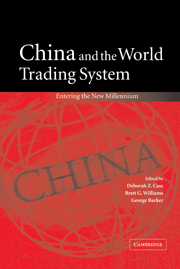Book contents
- Frontmatter
- Contents
- List of figures
- List of tables
- List of contributors
- Preface
- Acknowledgements
- Abbreviations and acronyms
- Introduction: China and the reshaping of the World Trade Organization
- PART I The world trading system
- PART II The accession
- PART III China – the domestic sphere
- 6 The state of the Chinese economy – structural changes, impacts and implications
- 7 Trade policy reform and China's WTO accession
- 8 China's WTO entry in labour surplus and Marxist terms
- 9 Enforcement of WTO agreements in China: illusion or reality?
- 10 China: trade, law and human rights
- PART IV Trade in goods
- PART V Trade in services and competition policy
- PART VI Intellectual property
- PART VII Dispute settlement
- Select bibliography
- Index
10 - China: trade, law and human rights
Published online by Cambridge University Press: 28 July 2009
- Frontmatter
- Contents
- List of figures
- List of tables
- List of contributors
- Preface
- Acknowledgements
- Abbreviations and acronyms
- Introduction: China and the reshaping of the World Trade Organization
- PART I The world trading system
- PART II The accession
- PART III China – the domestic sphere
- 6 The state of the Chinese economy – structural changes, impacts and implications
- 7 Trade policy reform and China's WTO accession
- 8 China's WTO entry in labour surplus and Marxist terms
- 9 Enforcement of WTO agreements in China: illusion or reality?
- 10 China: trade, law and human rights
- PART IV Trade in goods
- PART V Trade in services and competition policy
- PART VI Intellectual property
- PART VII Dispute settlement
- Select bibliography
- Index
Summary
‘If the realities of life were to coincide perfectly with theory, social science would be superfluous.’
‘Out of the crooked timber of humanity nothing straight was ever made.’
On 15 November 1999 the United States and China sealed their bilateral WTO deal, in the most significant development between those two countries since diplomatic relations were established nearly three cades ago. On 19 May 2000, China and the European Union finally concluded an agreement, and Australia and China signed their agreement three days later.
This chapter examines economic globalization and the new global agenda, noting what role the WTO sees itself playing within this, and how its perceptions differ from perceptions external to the WTO. The second section of the chapter looks at the human rights situation in China and the linking of trade negotiations to human rights dialogue. Structural problems in the Chinese legal system are highlighted with regard to the struggle for the rule of law and the enforcement of civil judgements. Recent legislative responses to growing domestic and international concerns in the light of China's accession to the WTO and intensifying human rights dialogues are canvassed.
Globalization, the WTO and human rights
Perceptions of globalization inside and outside the WTO
In an illuminating linguistic shift, Mike Moore, the former director-general of the WTO, twice during 2001 referred pejoratively to ‘globalization’. In Adelaide in February 2001 he referred to it as ‘that terrible word’, while three days later it was ‘that ugly word’.
- Type
- Chapter
- Information
- China and the World Trading SystemEntering the New Millennium, pp. 156 - 172Publisher: Cambridge University PressPrint publication year: 2003



